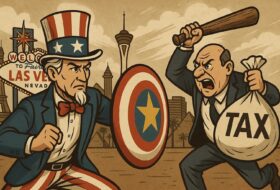
Lotteries in the United States made their displeasure known with the recent change in the interpretation of the Wire Act by the Department of Justice.
Lotteries vs. DOJ
The North American Association of State and Provincial Lotteries (NASPL) issued a statement on Monday saying the reversal on Wire Act guidance is bad for the industry. The NASPL includes most US and Canadian lotteries in its membership, while lottery providers IGT, Scientific Games and Intralot are “associate” members.
“The recent United States Department of Justice, (DOJ) reinterpretation of the Wire Act of 1961 creates a substantially detrimental impact on the lottery industry, including traditional retail-based draw and instant lottery games, as well as traditional lottery games offered over the Internet, and the billions of dollars for good causes lotteries provide,” the NASPL statement said.
Prior guidance from the DOJ said the Wire Act applied only to interstate sports betting, but the department changed course with a new opinion issued last month saying that it applies to all forms of interstate gaming. That has given rise to fears that it could impact forms of online gaming as well as lottery products, both conducted online and not.
The lottery statement comes as chatter has grown louder in the last few days that lotteries may challenge the new DOJ opinion in court in New Hampshire. New Hampshire is one of six states to have launched an iLottery program since 2011, and it is also in the 1st Circuit, where the US Court of Appeals stated in a 2014 case that the Wire Act was limited to sports betting.
Both the Pennsylvania online lottery and Michigan online lottery could be impacted by the DOJ opinion, among others.
The lotteries’ opinion on the Wire Act opinion …
The NASPL minced few words in saying what the Wire Act opinion could mean if actively and aggressively applied to lotteries:
”DOJ’s reinterpretation of the Wire Act creates substantial uncertainty concerning the legal status of lottery transactions, including these critical enhancements and improvements, many of which were made in reliance on the 2011 opinion, and the related contractual obligations and the industry’s ability to provide critically needed funding for important public interests.
The original 2011 opinion from the DOJ came at the behest of state lotteries, who were worried that the Wire Act could negatively impact their business. The NASPL says its members have made a lot of policy decisions that threaten to be unwound by the new opinion:
The 2011 DOJ opinion set in motion critical enhancements and improvements within the U.S. government-sanctioned lottery industry. These enhancements in lottery infrastructure, functionality, sales and communications not only advanced lottery technology capabilities but allowed lotteries to evolve into meeting consumers’ demands in a world of technology that was not even imagined in the era of the original Wire Act.
These enhancements and improvements complemented traditional retail transactions which have been going on for nearly five decades and have brought tens of billions of dollars in revenue to good causes throughout the country.
The lottery industry’s infrastructure enhancements have also provided lotteries increased transaction transparency and efficiency and are an important factor in the ability of lotteries to continue contributing billions of dollars annually to good causes throughout the country.
A Wire Act court challenge?
The stance of the lottery group would mesh with a potential court case looking to throw cold water on the new DOJ opinion.
The DOJ’s stance on the Wire Act does not hold the force of law — it is guidance only for prosecuting crimes under the Wire Act. In fact, there are two federal circuits which have previously held that the Wire Act only applies to sports betting, in agreement with the old opinion.
One of those circuits is the 1st Circuit, which covers New Hampshire. The state has an online lottery and could also move forward with sports wagering this year or next.
The NASPL and its members would be looking for a judgment in a circuit with friendly case law on the books, so NH makes sense as the most likely plaintiff to bring a case.
Meanwhile, the gaming and lottery industries have been waiting to see what the DOJ does next — if anything. Many are hoping — and likely believing — that the DOJ changes nothing on enforcement.
That would line up with handling of marijuana, as states have legalized and regulated its sale despite a negative climate in federal law.





